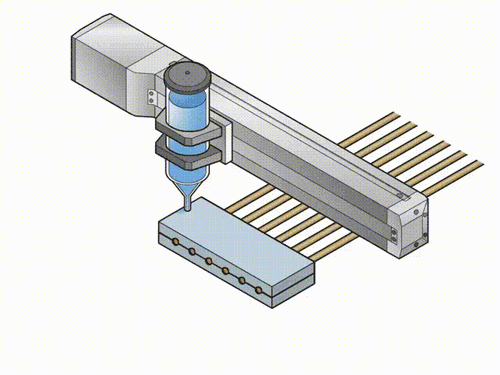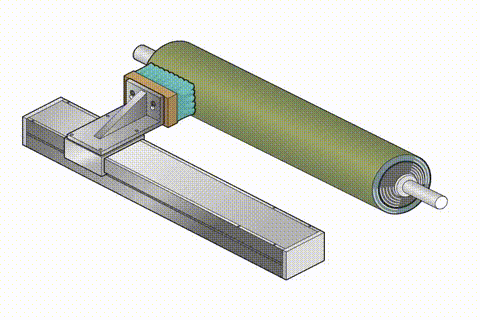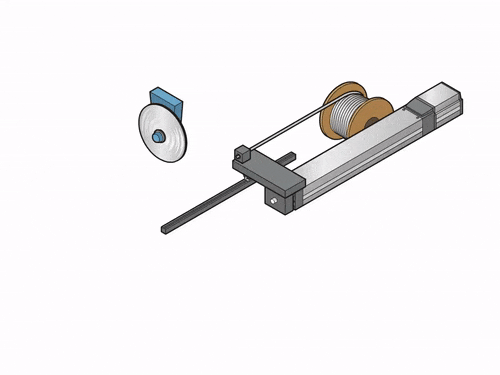
Failures were eliminated by replacing air cylinders with ROBO® Cylinders for the press-fit process.
| Cosmetics | |
| Failures were eliminated by replacing air cylinders with ROBO® Cylinders for the press-fit process – CT-Effects Application Example | |
 |
|
| [ Actuator ] | |
| RCP5-RA6C | |
[Issues until now]
- Press-fitting at high speed caused some caps to become deformed.
[Improvement Details]
- The Press-fit Motion was set to switch to low speed.
- The return movement was set to high-speed.
[Improvement Results]
Failure Occurrence Rate: 6% → 0%
The Cycle Time was Improved
Applying a liquid solution to a copper twisting machine – CT-Effects Application Example

Changing an air cylinder to ROBO Cylinder improved the cycle time for the solution application process.
| Papers /Films/Wires/Building Materials | |
| Changing an air cylinder to ROBO Cylinder improved the cycle time for the solution application process – CT-Effects Application Example | |

|
|
| [ Actuator ] | |
| RCP2-SA6C | |
– Uneven amounts of solution were supplied to the felt when low speeds caused instability.
– In an attempt to fix the unevenness, the discharge amount was increased but became excessive. This caused failures that led to Choco Tei* in the process.* Choco Tei = Stopping for a brief period, Idling in production line.
See brief video description.
– Eliminated Choco Tei in the processCycle Time Improved:
7sec →5sec
Choco Tei Reduced:
30min/day →zero
Cleaning cardboard printers with a pull-in roller- CT-Effects Application Example

Production has increased by motorizing the cleaning of cardboard printers with a pull-in roller
| Others | |
| Cleaning cardboard printers with a pull-in roller – CT-Effects Application Example | |
 |
|
| [ Actuator ] | |
| ISWA-L (Dust proof Splash-Proof Single-Axis Robot Slider Type) |
|
2) Incomplete cleaning due to the unevenness in the strength of the stroke of the brush.Since the brushing was repeated numerous times until the printer was completely clean, a lot of time was spent on the cleaning process.
Reduction in cleaning time (per day):
Reduced from 60min →10min
Production Time (per day):
12% increase from 420min →470min
Cutting Cords to Variable Specified Lengths – CT-Effects Application Example

Motorizing the feed process increased production, and significantly lowered electricity and labor costs.
| Papers/Films/Wires/Building Materials | |
| Cutting Cords to Variable Specified Lengths – CT-Effects Application Example | |
 |
|
| [ Robot/Electric Actuators ] | |
| RCP5-RA6C | |
– Air cylinders were used to feed a cord to a specified length.
– It took time to manually adjust the stopper position each time the product type was changed. (About 5 minutes per changeover = 1 hour/day)
– It was difficult to cut the correct length, causing workers to repeatedly inspect and adjust the cutting.
- [Improved with Motorization]
– Manually adjusting the stopper position was totally eliminated. Adjustments are now done by entering the feed amount on a touch panel. Manual changeovers are a thing of the past.
– Using a value command function in the ROBO Cylinder made it easy to cut lengths of specified varieties. The manual labor for adjustments was significantly reduced.
[Improvement Results]– Production was increased from 7 hours per day to 8 hours.
– Reducing the number of steps also reduced labor costs.
| Reduced man-hours needed for: | |
| – changeover time: 60 minutes/day – cut inspection and adjustment time: 120 minutes/day |
→ Total of 3 hours/day |
| (Annual Example) – Labor Time of 3 hours/day (times 250 days/year) – 3 hours X $10 X 250 days |
If labor costs $10/hour → Annual Savings of $7,500 |
*Exchange Rate: 1(USD)=100(Japanese Yen)
Electricity costs reduced with motorization
(Example) Work load: 3kg, Moving distance: 200m
Cycle time: 3 sec. One-day running time: 8 hours
Annual operation days: 250 days
Unit Price: (Air) $0.24/m3 (Electric) $0.15/KWH
| 〈 Annual Electricity Costs 〉Approximately 95% reduced | |
| Air Cylinder$117.67/year (Cylinder inner diameter φ25mm) |
Electric Cylinder$5.67/year (□56motor) |
